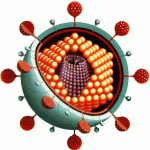Virology
|
18 june 2018 17:00:48 |
| Viruses, Vol. 10, Pages 281: Yeast Derived LysA2 Can Control Bacterial Contamination in Ethanol Fermentation (Viruses) |
|
Tweet Contamination of fuel-ethanol fermentations continues to be a significant problem for the corn and sugarcane-based ethanol industries. In particular, members of the Lactobacillaceae family are the primary bacteria of concern. Currently, antibiotics and acid washing are two major means of controlling contaminants. However, antibiotic use could lead to increased antibiotic resistance, and the acid wash step stresses the fermenting yeast and has limited effectiveness. Bacteriophage endolysins such as LysA2 are lytic enzymes with the potential to contribute as antimicrobials to the fuel ethanol industries. Our goal was to evaluate the potential of yeast-derived LysA2 as a means of controlling Lactobacillaceae contamination. LysA2 intracellularly produced by Pichia pastoris showed activity comparable to Escherichia coli produced LysA2. Lactic Acid Bacteria (LAB) with the A4α peptidoglycan chemotype (L-Lys-D-Asp crosslinkage) were the most sensitive to LysA2, though a few from that chemotype were insensitive. Pichia-expressed LysA2, both secreted and intracellularly produced, successfully improved ethanol productivity and yields in glucose (YPD60) and sucrose-based (sugarcane juice) ethanol fermentations in the presence of a LysA2 susceptible LAB contaminant. LysA2 secreting Sacharomyces cerevisiae did not notably improve production in sugarcane juice, but it did control bacterial contamination during fermentation in YPD60. Secretion of LysA2 by the fermenting yeast, or adding it in purified form, are promising alternative tools to control LAB contamination during ethanol fermentation. Endolysins with much broader lytic spectrums than LysA2 could supplement or replace the currently used antibiotics or the acidic wash. |
| 47 viewsCategory: Epidemiology, Virology |
 Viruses, Vol. 10, Pages 282: K15 Protein of Kaposi`s Sarcoma Herpesviruses Increases Endothelial Cell Proliferation and Migration through Store-Operated Calcium Entry (Viruses) Viruses, Vol. 10, Pages 282: K15 Protein of Kaposi`s Sarcoma Herpesviruses Increases Endothelial Cell Proliferation and Migration through Store-Operated Calcium Entry (Viruses)Viruses, Vol. 10, Pages 280: Multiple, Independent T Cell Lymphomas Arising in an Experimentally FIV-Infected Cat during the Terminal Stage of Infection (Viruses) 
|
| blog comments powered by Disqus |
MyJournals.org
The latest issues of all your favorite science journals on one page
The latest issues of all your favorite science journals on one page



